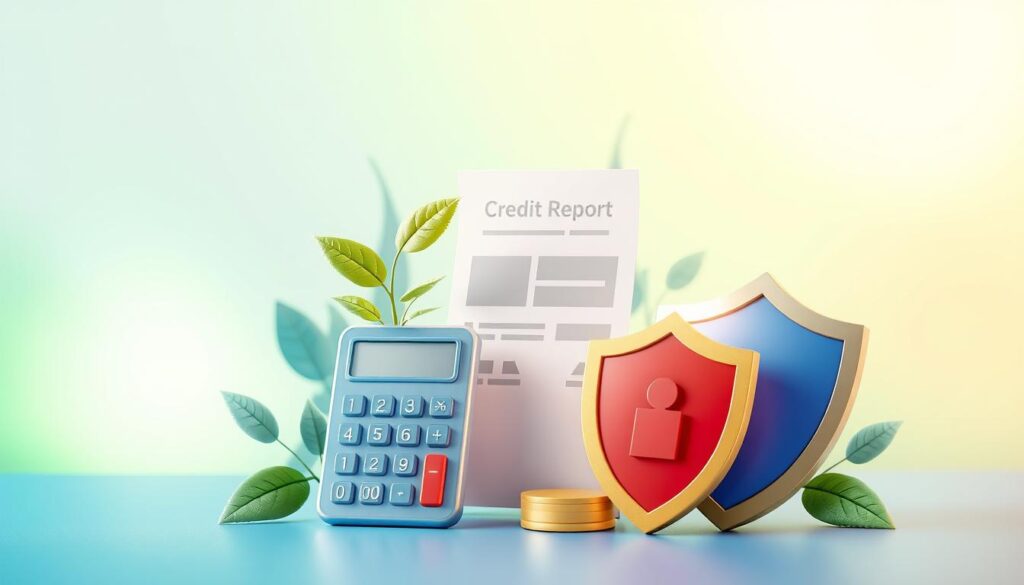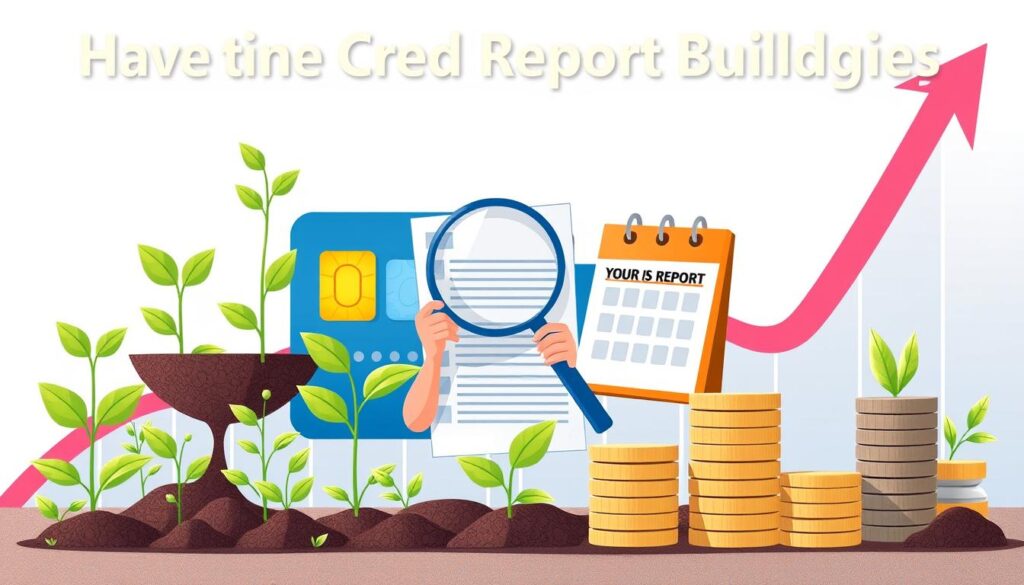Your credit score is key to your financial health. It shows how well you handle credit. A higher score means better loan chances and lower interest rates.
Simple steps can quickly improve your score. Check your credit reports often and pay bills on time. These actions can start your credit score journey fast.
Understanding credit basics is the first step to financial control. It lets you shape your financial future.
Credit Score Improvement Key Takeaways
- Payment history significantly impacts your credit score, emphasizing the importance of on-time payments.
- Keeping your credit utilization rate below 30% shows lenders that you manage credit responsibly.
- Maintaining established lines of credit is crucial for a strong credit profile.
- Diversifying your credit accounts can positively influence your overall score.
- Reducing outstanding balances monthly demonstrates your ability to make timely payments.
- Be mindful of hard inquiries, as multiple applications for new credit can adversely affect your score.
Why Improving Your Credit Score Is Essential
Knowing your credit score’s importance is key to better financial health. It shows how trustworthy you are with money. Learning about credit scores helps you improve your financial standing.
Understanding Credit Scores
Credit scores come from your payment history, how much credit you use, and the types of accounts you have. Working to improve your creditworthiness can bring big benefits. For example, the average FICO score hit a record high of 716 in 2021.
This shows most people now have “good” credit. A score of 620 is often needed for things like apartments and loans. So, you can use strategies to boost your score.
Read more: Unlock Brazilian Benefits: Your Credit Card Guide
Impact of a Good Credit Score
A good credit score brings many financial perks. It can lower your borrowing costs. For instance, you could save at least $200 a month on a 30-year mortgage with a good score.
Good scores also mean lower insurance rates for many. Plus, they can get you into rewards credit cards and special benefits. Credit scores affect more than just loans. They can help you get jobs and spot credit mistakes.
By improving your credit, you’re preparing for a stronger financial future. It’s a smart move for your money.
| Credit Score Range | Credit Rating | Typical Use |
|---|---|---|
| 300 – 579 | Poor | Limited access to loans and credit |
| 580 – 669 | Fair | Possible qualification for basic loans |
| 670 – 739 | Good | Better loan terms and access to rewards cards |
| 740 – 799 | Very Good | Excellent options for loans and better rates |
| 800 – 850 | Excellent | Top benefits on all credit products |
Credit Score Improvement Techniques to Consider
Improving your credit score takes understanding different strategies. Using effective techniques can greatly boost your score over time. Keeping an eye on your credit and making payments on time are key to fixing your credit.
Review Your Credit Reports Regularly
Begin by checking your credit reports from Experian, Equifax, and TransUnion. You get one free report from each bureau every year. This is vital for finding errors or accounts that hurt your score. Regular checks help you stay on top of your credit status and fix any issues.
Make On-Time Payments
On-time payments are crucial for your credit score. In fact, they make up 35% of your FICO score. Setting up automatic payments or reminders can help avoid late fees. This way, you can improve your score steadily.
By using these techniques, you can better manage your finances and improve your credit score. Always make payments on time. This is a key way to increase your credit score.
Effective Credit Building Strategies
Improving your credit score takes a few key steps. Start by managing how much credit you use and by having different types of credit. These steps can really help your score go up over time.
Manage Your Credit Utilization Rate
Your credit utilization rate is very important for your score. It shows how much of your available credit you’re using. To boost your score, try to keep this rate under 30%. Here’s how:
- Paying down what you owe on credit cards.
- Asking for higher credit limits, which can instantly lower your rate.
Controlling your credit use not only raises your score. It also shows lenders you’re good with money.
Diversify Your Credit Accounts
Having different kinds of credit can also improve your score. Mix it up with:
- Credit cards
- Installment loans
This variety can make your credit history look better. It shows you can handle different financial tasks well. Plus, keeping old accounts open helps your credit history grow longer.
Credit Score Improvement Tips for Quick Results
Looking to boost your credit score fast? Certain strategies can help you see quick improvements. By using effective credit repair tips, you can significantly change your score in a short time. Focus on specific actions to take control of your credit and improve your financial health.
Pay Down Revolving Credit Balances
Paying down revolving credit balances, especially on credit cards, is very effective. Try to keep your credit utilization ratio under 30%. This not only reduces your debt but also boosts your credit score. It makes you more appealing to lenders.
Dispute Inaccurate Information on Your Credit Report
Fixing errors on your credit report is key to a good credit score. Studies show about 25% of people have mistakes on their reports. These errors can hurt your creditworthiness. By checking your report yearly, you can spot and fix these issues. This simple step can quickly improve your credit status.
Improving your credit score is not just possible; it’s key for your financial health. By checking your credit reports often and paying on time, you boost your credit history. Remember, your payment history is 35% of your FICO score. So, making payments on time is crucial.
Also, keep your credit use under 30% on all accounts to help your score. Adding different types of credit accounts can also improve your score. But, improving your credit score takes time and effort.
Your credit score affects your financial future a lot. It impacts your ability to get loans and good credit deals. By understanding these points and taking action, you can greatly improve your credit score. This will put you in a better financial spot.
Share this content:


